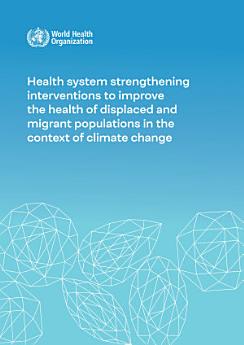Health system strengthening interventions to improve the health of displaced and migrant populations in the context of climate change
World Health Organization
Jul 2025 · World Health Organization
Ebook
112
Pages
family_home
Eligible
info
reportRatings and reviews aren’t verified Learn More
About this ebook
This is the seventh report in the Global Evidence Review on Health and Migration (GEHM) series. The publication examines how health systems are responding to the health needs of migrant and displaced populations in the context of climate change. Drawing on a review of 95 health system interventions across WHO’s six health system building blocks, it highlights current approaches, evidence gaps, and opportunities for strengthening migrant-inclusive and climate-resilient health systems. Key findings include the adaptation of existing interventions to new scenarios as well as innovative new practices. The review also identified main gaps in the evidence, particularly regarding longer-term interventions, broader planning and preparedness, and building resilience into health systems. Policy considerations are proposed to support more adaptive, inclusive, and coordinated responses to the health impacts of climate change on migrant and displaced populations. These include proactive long-term strategies to ensure migrant-inclusive health systems through a whole-of-route approach, and meaningful engagement of affected communities in policy, planning, and delivery. Ensuring that health systems are both migrant-inclusive and climate-resilient is critical for advancing health equity and system preparedness in an increasingly unstable climate.
Rate this ebook
Tell us what you think.
Reading information
Smartphones and tablets
Install the Google Play Books app for Android and iPad/iPhone. It syncs automatically with your account and allows you to read online or offline wherever you are.
Laptops and computers
You can listen to audiobooks purchased on Google Play using your computer's web browser.
eReaders and other devices
To read on e-ink devices like Kobo eReaders, you'll need to download a file and transfer it to your device. Follow the detailed Help Center instructions to transfer the files to supported eReaders.








